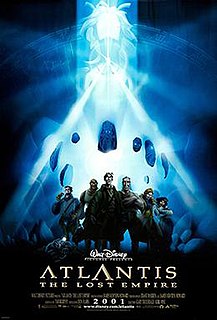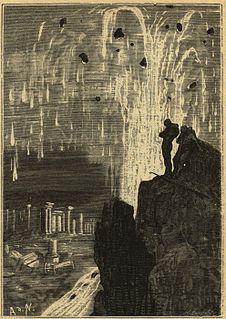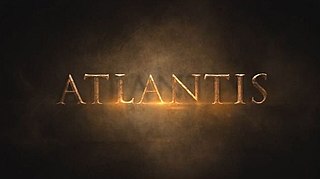
Atlantis is a fictional island mentioned in an allegory on the hubris of nations in Plato's works Timaeus and Critias, where it represents the antagonist naval power that besieges "Ancient Athens", the pseudo-historic embodiment of Plato's ideal state in The Republic. In the story, Athens repels the Atlantean attack unlike any other nation of the known world, supposedly bearing witness to the superiority of Plato's concept of a state. The story concludes with Atlantis falling out of favor with the deities and submerging into the Atlantic Ocean.

Indiana Jones and the Fate of Atlantis is a point-and-click adventure game by LucasArts originally released in 1992. Almost a year later, it was reissued on CD-ROM as an enhanced "talkie" edition with full voice acting and digitized sound effects. In 2009, this version was also released as an unlockable extra of the Wii action game Indiana Jones and the Staff of Kings, and as a digitally distributed Steam title. The seventh game to use the script language SCUMM, Fate of Atlantis has the player explore environments and interact with objects and characters by using commands constructed with predetermined verbs. It features three unique paths to select, influencing story development, gameplay and puzzles. The game used an updated SCUMM engine and required a 286-based PC, although it still runs as a real-mode DOS application. The CD talkie version required EMS memory enabled to load the voice data.

Aquaman is a fictional superhero appearing in American comic books published by DC Comics. Created by Paul Norris and Mort Weisinger, the character debuted in More Fun Comics #73. Initially a backup feature in DC's anthology titles, Aquaman later starred in several volumes of a solo comic book series. During the late 1950s' and 1960s' superhero-revival period known as the Silver Age, he was a founding member of the Justice League. In the 1990s' Modern Age, writers interpreted Aquaman's character more seriously, with storylines depicting the weight of his role as king of Atlantis.

Graham Bruce Hancock is a British writer and journalist. He is known for his pseudoscientific theories involving ancient civilisations, Earth changes, stone monuments or megaliths, altered states of consciousness, ancient myths, and astronomical or astrological data from the past.

Atlantis: The Lost Empire is a 2001 American animated science-fantasy action-adventure film created by Walt Disney Feature Animation, marking the 41st entry in Disney's animated features canon and its first science-fiction film. Written by Tab Murphy, directed by Gary Trousdale and Kirk Wise, and produced by Don Hahn, the film features an ensemble cast with the voices of Michael J. Fox, Cree Summer, James Garner, Leonard Nimoy, Don Novello, Phil Morris, Claudia Christian, Jacqueline Obradors, Jim Varney, Florence Stanley, John Mahoney, David Ogden Stiers and Corey Burton. Set in 1914, the film tells the story of a young man who gains possession of a sacred book, which he believes will guide him and a crew of mercenaries to the lost city of Atlantis.
Stargate is a military science fiction media franchise based on the film directed by Roland Emmerich, which he co-wrote with producer Dean Devlin. The franchise is based on the idea of an alien Einstein–Rosen bridge device that enables nearly instantaneous travel across the cosmos. The franchise began with the film Stargate, released on October 28, 1994, by Metro-Goldwyn-Mayer and Carolco, which grossed US$197 million worldwide. In 1997, Brad Wright and Jonathan Glassner created a television series titled Stargate SG-1 as a sequel to the film. This show was joined by Stargate Atlantis in 2004, Stargate Universe in 2009, and a prequel web series, Stargate Origins, in 2018. Also consistent with the same story are a variety of books, video games and comic books, as well as the direct-to-DVD movies Stargate: Children of the Gods, Stargate: The Ark of Truth, and Stargate: Continuum, which concluded the first television show after 10 seasons.
Atlantis is a legendary island first mentioned by Plato.

Atlantis: The Antediluvian World is a pseudoarchaeological book published in 1882 by Minnesota populist politician Ignatius L. Donnelly, who was born in Philadelphia, Pennsylvania in 1831. Donnelly considered Plato's account of Atlantis as largely factual and suggested that all known ancient civilizations were descended from this lost land.

Fingerprints of the Gods: The Evidence of Earth's Lost Civilization is a 1995 pseudoarcheology book by Graham Hancock, in which the author echoes 19th-century writer Ignatius Donnelly, author of Atlantis: The Antediluvian World (1882), in contending that an enigmatic, ancient, advanced civilization existed in prehistory, one which served as the common progenitor civilisation to all subsequent known ancient historical ones. The author proposes that sometime around the end of the last Ice Age this civilisation ended in cataclysm, but passed on to its inheritors profound knowledge of such things as astronomy, architecture and mathematics.

The fictional island of Atlantis has often been depicted in literature, television shows, films and works of popular culture.
David Gibbins is an underwater archaeologist and a bestselling novelist.
Henriette Mertz (1898–1985) was an American patent attorney from Chicago and a proponent of pseudoarchaeological hyperdiffusionism in relation to ancient American history. During World War II, she worked as a code-breaker for the U.S. government's cryptography department. She published several controversial works during the 1960s and 1970s relating to the early discovery and settlement of America.
Esoteric Nazism or Esoteric Hitlerism is any of a number of mystical interpretations and adaptations of Nazism in the post–World War II period. After 1945, esoteric interpretations of the Third Reich were adapted into new religious movements of white nationalism and neo-Nazism.
Alan F. Alford, was a British writer and speaker on the subjects of ancient religion, mythology, and Egyptology.

White gods is the belief that ancient cultures around the world were visited by Caucasian races in ancient times, and that they were known as "White gods".

Atlantis is an archaeological adventure novel by David Gibbins. First published in 2005, it is the first book in Gibbins's Jack Howard series. It has been published in 30 languages and has sold over a million copies, and is the basis for a TV miniseries currently in development.

Crusader Gold is an archaeological adventure novel by David Gibbins. First published in 2006, it is the second book in Gibbins's Jack Howard series. It has been published in more than 20 languages and was a New York Times bestseller.

The Last Gospel is an archaeological adventure novel by David Gibbins. First published in 2008, it is the third book in Gibbins' Jack Howard series. It has been published in more than 20 languages and was a London Sunday Times top-ten bestseller and a New York Times top-ten bestseller.

The Tiger Warrior is an archaeological adventure novel by David Gibbins. First published in 2009, it is the fourth book in Gibbins' Jack Howard series. It has been published in 18 languages and was a New York Times bestseller.

Atlantis is a British fantasy-adventure television programme, inspired by Greek mythology and created by Johnny Capps and Julian Murphy with Howard Overman. It premiered on 28 September 2013 on BBC One.














